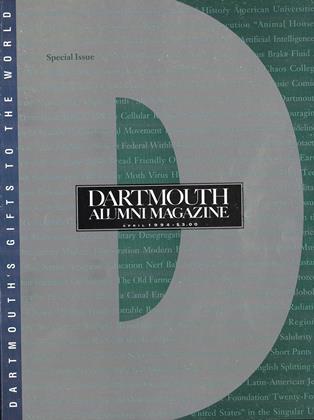A Baker's dozen of the best Green literature, chosen, albeit subjectively, by the editors.
The Poetry of Robert Frost: Collected Poems (Henry Holt). His work is telescopic: Through his small but powerful New England lens he viewed the universe and God, or the lack of one. This volume by the long-time part-time Dartmouth instructor and member of the class of 1896 was edited by Dartmouth Librarian Emeritus Edward Connery Lathem '51.
The Cat in the Hat, by Dr. Seuss (Random House). With just two words "cat" and "hat" Theodor Seuss Geisel '25 won universal acceptance of the notion that a primer can be saucy, fun, and utterly unDick-Jane-&-Sally-like.
A River Runs Through It, by Norman Maclean '24 (University of Chicago Press). "I am haunted by waters," reads the last line of A River. So is anyone who has read this powerful novella about fishing, boyhood, and deity.
The Old Farmer's Almanac (Yankee). It is not a book, exactly, but it is undoubtedly history's best-selling work of literature created expressly for the bathroom (the hole in the corner is for hanging in one's outhouse). Judson D. Hale '55 is the latest of just three editors in the almanac's 202-year history.
The Webster Papers, by Daniel Webster 1801 (Dartmouth and University Press of New England). This triumph of scholarship-Is volumes of correspondence, speeches and formal writings, diplomatic papers, and legal papers is an appropriate monument to one of America's greatest public minds.
Man & Nature, by George Perkins Marsh 1820 (Scribner). Marsh was the first to present a pragmatic argument for conserving natural resources. His book, a world bestseller in the 1860s, is eminently readable today.
The Dartmouth Bible, abridged and annotated by Roy Chamberlain and Herman Feldman (Houghton-Mifflin). This version of the Bible reads in parts like a novel, in other parts like the kind of gripping lectures the two editors professors at Dartmouth would give to undergraduates.
Collected Poems, 1930-1986, by Richard Eberhart '26 (Oxford University Press). A professor of English and a poet in residence at Dartmouth since 1956, Eberhart is known for his flawless technique and his mastery of a broad range of emotional and dramatic subjects.
Arab and Jew, by David Shipler '64 (Times Books). This analysis of the Middle East by a former New York Times reporter went beyond mere politics to cover the tragedy of two colliding peoples. Subtitled "Wounded Spirits in a Promised Land," the book won the Pulitzer Prize when it was published in 1986.
Love Medicine, by Louise Erdrich '76 (Bantam Books). Before Erdrich, most publishers thought general audiences could not be enticed into the world of fictional Native Americans. But the story of the varied lives of Dakota Chippewa made the bestseller list and won the National Book Award in 1984. Ever since, Erdrich has stood out in the American literary landscape.
A Hebrew Grammar, by John Smith 1773 (J. West). "Designed to facilitate the study of the Scriptures of the Old Testament, in the original; and particularly adapted to the use of those who may not have instructors, "this book by a Dartmouth professor was the first of its kind to be published in America at a time when Hebrew was essential to a liberal education.
Webster's Third New International Dictionary, edited by Philip Babcock Gove '22 Nerruan-Webster). Selling two million copies, this dictionary set new standards when it was published in 1961. It included an unprecedented use of slang, along with single-phrase definitions. Philologists call it one of the best dictionaries ever printed.
The Broken Cord, by Michael Dorris (Harper & Row). Dorris's first-hand account of his adoptive son's struggle with fetal alcohol syndrome brought this preventable handicap to the public's attention. Dorris is a former Dartmouth anthropology professor and founding director of the Native American Studies Program.
 View Full Issue
View Full Issue
More From This Issue
-
 Cover Story
Cover StoryROSTER OF DARTMOUTH'S GIFTS TO THE WORLD
April 1994 -
 Class Notes
Class Notes1993
April 1994 By Christopher K. Onken, -
 Class Notes
Class Notes1981
April 1994 By Karen McKeel Calby, -
 Class Notes
Class Notes1989
April 1994 By Dan Parish, -
 Class Notes
Class Notes1983
April 1994 By Deborah Michel Rosch. -
 Class Notes
Class Notes1979
April 1994 By Tom O'Neil,
Article
-
 Article
ArticleBOWLER FARMS OPEN FOR NINTH SEASON
May 1921 -
 Article
ArticleREV. JOHN W. HAYLEY, SECOND OLDEST GRADUATE DIES
DECEMBER 1927 -
 Article
Article"Eagle" Publisher
March 1948 -
 Article
ArticleHarvard Game Relaxer
APRIL 1971 -
 Article
ArticlePresidential Search
June 1980 -
 Article
ArticleThe Cabin That Would Not Burn
April 1993 By Heather Killebrew '89

